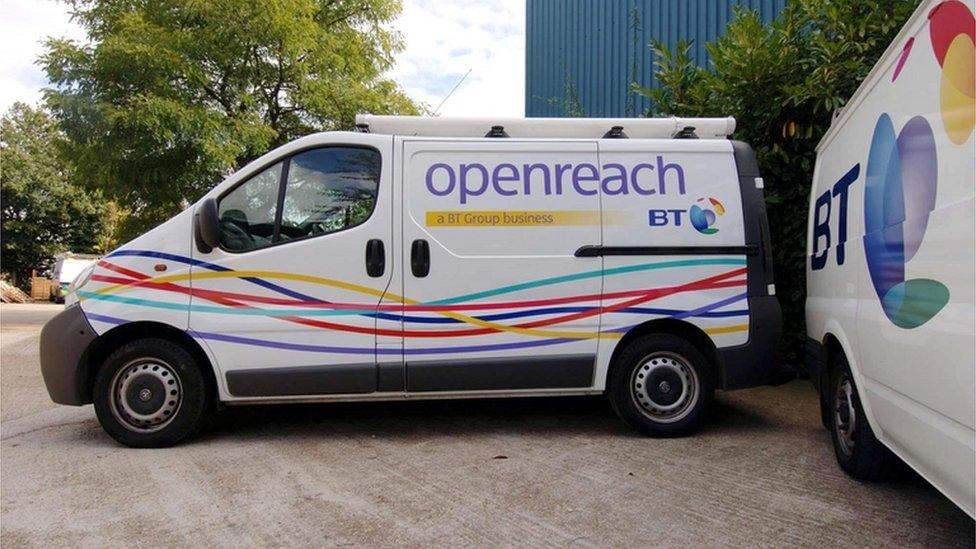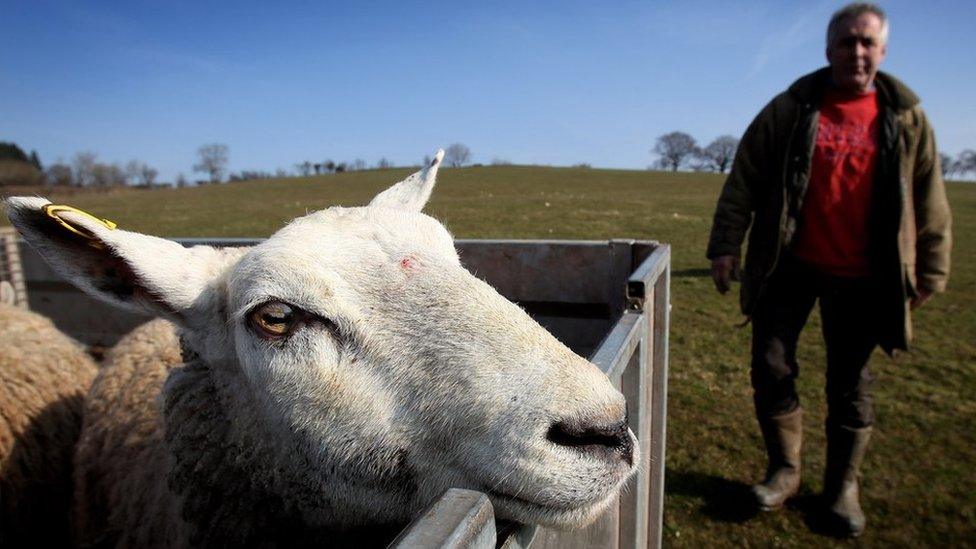BT's broadband divorce - what it means for consumers
- Published
It is one of the most dragged-out divorces in corporate history but it seems that BT and Openreach will definitely go their separate ways.
Talks between BT and regulator Ofcom to find a voluntary solution to the problem seem to have broken down.
Ofcom has now begun the formal process of forcing a legal split.
The big question is what will it all mean for consumers.
Why do the two need to split?

The argument for separation centres around whether the firm that provides the vast majority of the UK's broadband infrastructure (Openreach) should be part of the same parent group as one of the UK's leading internet service provides (BT).
Rivals have long argued that this is bad for competition and the consumer. TalkTalk's Dido Harding was one of the first to welcome Ofcom's new tough stance: "Openreach has been letting consumers down for far too long, unable to meet promises of even minor improvements and becoming a household name for all the wrong reasons."
Ofcom agrees and, now too, does the government: "We've been clear that we need a more independent Openreach. It needs to offer genuinely fair and equal access to the country's telecoms infrastructure to BT's competitors," said a spokesman for the Department for Culture, Media and Sport.
This is the best way to ensure consumers get the service they need, and the country gets the digital infrastructure it needs," he added.
I live in a rural broadband notspot - how would a split improve life for me?

Many farmers are crying out for faster internet connectivity, says the National Farmers' Union
Slow and non-existent broadband is still an issue in remote areas and most agree that is unacceptable in an age where telecoms are as important as gas, electricity and water.
Openreach has been criticised for the slow rollout of rural broadband and for failing to offer radical new technologies. But, on the flipside, there are no large queues of other operators lining up to fix the problem, which is expensive and technically challenging.
The Countryside and Landowners' Alliance pointed out that any split must make sure that the work Openreach is doing to close the digital divide can continue unhindered.
"Any formal break between BT and Openreach must not lose sight of the goal to deliver broadband to rural areas. Ofcom must make it clear that the conditions of the separation include guarantees for future investment to further support rural digital connectivity," it said in a statement.
Will a split lead to better, cheaper broadband?

What consumers really need, according to Andrew Ferguson, founder of the broadband news website ThinkBroadband, is "fibre to the home with gigabit speeds for £20 to £35 per month".
Fibre-to-the-home technology offers faster speeds than the majority of current broadband connections, which are known as "fibre to the cabinet", meaning the final connection to homes is delivered over slower copper wire.
Mr Ferguson told the BBC that no-one currently knows whether a legal separation will deliver this faster option.
"The split has the potential to be very transformational and start the UK down a path of 95% fibre-to-the-premises coverage in 10 years, but that was a possibility yesterday too. The key is whether the split means more money will be available and if a fibre-to-the-premises (home) product is adopted by operators like Sky and TalkTalk," he said.
"The hope is that by reducing the influence of BT Group on Openreach, it would be likely to invest more in faster broadband technology that allows more providers, such as Sky and TalkTalk as well as BT, to offer a better service to their customers."
But, he added, there is a counter-argument that an independent Openreach could create "a stock market that gets jittery which means that Openreach is starved of capital and struggles to meet what its critics have said are already unambitious rollout targets".
Most agree that a separation of BT and Openreach would not alone solve the UK's broadband problems.
Richard Neudegg, head of regulation at uSwitch, said: "Ofcom needs to act across the board to ensure competition and service improvements. This includes universal service obligations, quality of service requirements on regulated products and automatic compensation when providers fail to deliver.
Some believe that the real problem with the UK's broadband is that the copper network simply does not offer the bandwidth and reliability to support our increasingly data-rich needs.
Founder of Mimosa Networks, Jaime Fink thinks it is time to consider other technologies: "Openreach and other UK service providers must change their approach and look at new technologies that can profitably deliver a superfast sustainable broadband network."
He pointed to the US where new entrants such as Google and Facebook have shaken up the market with fixed wireless solutions, which are less expensive than fibre.
Will a split improve customer service?

Broadband customers do not deal directly with Openreach at the moment
You have a broadband fault but it is taking weeks to fix. Sound familiar?
One of the biggest arguments in favour of a split is that Openreach has just not provided adequate levels of customer service. Critics say this is because it is not a customer-facing firm so all complaints are channelled via a customer's ISP, giving it no incentive to get on with repairs.
"Millions of people have suffered woeful levels of service from Openreach, so these reforms must lead to significant improvements for customers who have been let down for too long," said Which's Alex Neill, managing director of Home and Legal.
But will a separation deliver this?
It may depend on how the separation looks, thinks Ovum analyst Matthew Howett.
"The improvements in quality and availability of service that Ofcom hopes legal separation will bring about will likely to be delivered much sooner if BT can get on and deliver them today as a result of a voluntary agreement, rather than wait for a lengthy and uncertain process to run its course at the EU level," he told the BBC.
In order to start the legal separation, Ofcom must now prepare a formal notification to the European Commission to start the process.
Mr Howett believes that the door is still open for a voluntary agreement from BT.
"In many ways that would be a better outcome than a forced legal separation, not least because the EU route is uncertain, untested and likely to take much longer to achieve. It is also of course made more complex by the decision from Britain to leave the EU."
- Published6 May 2016

- Published29 November 2016
